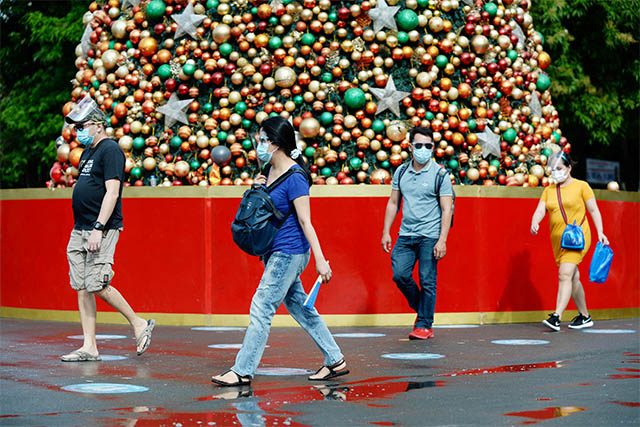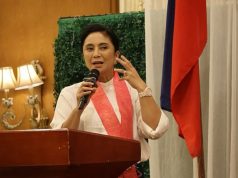
Filipino workers aired concerns over missing family traditions and meager benefits after the national government declared some previous holidays as “special working days.”
Under Proclamation 1107, President Rodrigo Duterte made changes to three dates wherein special occasions are normally observed:
- November 2, 2021 – All Souls’ Day
- December 24, 2021 – Christmas Eve
- December 31, 2021 – New Year’s Eve
This amended Proclamation No. 986 series of 2020, wherein all three dates were classified as “special non-working holidays.”
Under the Labor Code, a special non-working holiday applies the “no work, no pay” principle.
However, if a worker is called on duty on the special day, an additional 30% will be added to his or her regular salary for the first eight hours, and then additional 30% per hour after.
The same principle of “no work, no pay” will be observed on “special working days.”
Duterte said the amendment was made to help the pandemic-hit economy recover.
“For the country to recover from the adverse economic impact of the COVID-19 pandemic, there is a need to encourage economic productivity by, among others, minimizing work disruption and commemorating some special holidays as special (working) days instead,” he said in the proclamation.
The rest of the schedule for 2021 will remain unchanged.
What were the concerns and complaints?
No more extra pay
Bar 2019 topnotcher Mae Diane Azores, who previously handled a prominent case about detained jeepney drivers, pointed out that changing some of the special non-working holidays into working days will deprive some laborers their much-needed work benefits.
“If you don’t work on the 24th and 31st of December, we apply the principle, ‘no work, no pay’. Pero kapag nag-file ka ng leave, paid naman. Kaya lang, di lahat ng employer generous sa leave credits,” Azores said.
Newly hired employees are also not entitled to leave credits, Azores noted.
“Problema rin kung bago ka pa lang sa work at wala ka pa enough leave credits. In those cases, kakailangan mo pumasok kung hindi AWOL (absence without leave) ka besh. Tapos di ka pa makakaclaim ng holiday pay para sa regular holidays, or for Christmas and New Year,” she wrote.
Good morning, #SKL implications ng pagtanggal sa Christmas Eve and New Year’s Eve as special non-working holidays:
If you don’t work on the 24th and 31st of December- we apply the principle, “no work, no pay”. Pero kapag nag-file ka ng leave, paid naman. Kaya langggg, di lahat
— Diane♥️✊ (@MaeDianeAzores) February 26, 2021
Sen. Risa Hontiveros echoed this view, adding that Filipinos who normally work during these times are front-liners and essential workers who needed the additional 30% to their wages.
“Tandaan natin, marami sa mga kababayan natin na nagta-trabaho sa mga holiday na iyan ay mga frontliner at essential worker gaya ng medical workers, mga ate at kuya natin sa hotels, restaurants, groceries, at malls na karamihan ay minimum wage ang kita,” Hontiveros said.
Tandaan natin, marami sa mga kababayan natin na nagta-trabaho sa mga holiday na iyan ay mga frontliner at essential worker gaya ng medical workers, mga ate at kuya natin sa hotels, restaurants, groceries, at malls na karamihan ay minimum wage ang kita.
— risa hontiveros (@risahontiveros) March 1, 2021
Missing family traditions
Some Filipinos, meanwhile, pointed out that these are the only few dates where they pay their respects to the departed and spend time with their loved ones.
“All Soul’s Day, Christmas Eve, and December 31, those are decidedly Christian/Catholic/family holidays, which a majority use to get together with their families,” one Reddit user said.
“As if these three days will have any effect. The mentioned holidays are for paying respect to departed souls and family bonding time with love ones that we need to travel to for the yuletide holidays,” a Facebook user commented.
Holidays help the economy more
Some Filipinos argued that the public normally spends more on days without work.
“Mas makakabangon nga ang ekonomiya kapag may holiday kasi yung economic indicators natin is driven by personal consumptions. Gumagastos ang mga tao kapag naka holiday. Yung ayusin dapat mga special holidays. As if papasok ang government sa mga ganitong araw,” one user wrote.
One Facebook user also noted the higher risk of transmissions for the public if they go to work instead of spending time at home.
“We’re in the middle of the pandemic and will still go on during those months and you wanted people to be like sardines on rush hour to celebrate the festivities with their families,” the user commented.
Just a prank
There are a few social media users who quipped that the holiday schedule change is just a trick wherein a close ally will talk to Duterte about the matter.
The president will then change his mind, thus painting the ally in a good light.
“Gawa ng sariling problema tapos may solusyon din para mabango pangalan bago mag-eleksyon,” one user said.
“Malaki ang implikasyon niyan kasi ‘di ba kapag ang mga workers natin pinatrabaho on a regular holiday, mas marami ang bayad sa kanila,” Robredo said.
“Kapag ginawa mong special working day, magiging regular ang bayad sa kanila,” she added.
Robredo said there are other ways to alleviate the economic woes.
“Marami namang paraan pero parang bakit ito ang nakita? Bakit ito ang nakitang paraan para mabuksan ang ekonomiya?” she asked.









